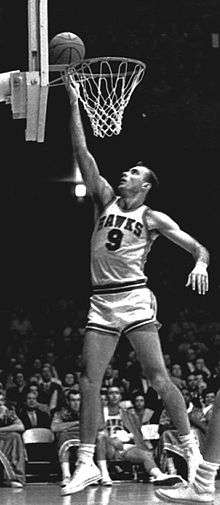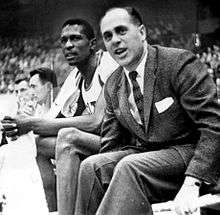Ben Kerner
| Ben Kerner | |
|---|---|
| Born | June 9, 1913 |
| Died |
November 22, 2000 (aged 87) St. Louis, Missouri |
| Occupation | Businessman, sports-franchise founder and owner, basketball executive |
| Years active | 1946–1968, as owner of NBA's Tri-Cities Blackhawks, Milwaukee Hawks and St. Louis Hawks |
| Spouse(s) | Ima Jean Kerner (1934–2011) |
Ben Kerner (June 9, 1913 – November 22, 2000) was an American professional basketball owner. He was the founder and owner of the St. Louis Hawks of the National Basketball Association, the present-day Atlanta Hawks. In 1946 Kerner founded a professional team in Buffalo, New York, which became the Moline, Illinois-based Tri-Cities Blackhawks after a few games. Kerner moved the team to Milwaukee in 1951 and to St. Louis in 1955. His 1958 St. Louis Hawks won the NBA Championship.[1][2]
Notable transactions

During the 1946-47 season, Kerner added Pop Gates to the Buffalo-Tri-Cities team. Gates finished second on the team in scoring, behind 1948 NBL MVP Don Otten. A Naismith Memorial Basketball Hall of Fame player, Gates was a factor in integrating the league and the first African-American coach in a major league when he coached Dayton in 1948.[3][4]
Kerner hired Naismith Hall of Fame coach Red Auerbach for the Tri-Cities Blackhawks in 1949. When he discovered that Kerner had traded a player without consulting him, Auerbach left the Blackhawks to coach the Boston Celtics for the 1950-51 season[5] and won a record nine NBA championships with the Celtics.[6][7]
In 1950, Kerner drafted Naismith Hall of Fame player Bob Cousy in the first round (number four) and sold him to the Chicago Stags. Cousy, reportedly unhappy to go to a small-town area, wanted $10,000 to sign with the Blackhawks and Kerner countered with $6,000 before selling him to the Stags.[2] Cousy played for Auerbach in Boston when the Stags were sold, and played in 13 consecutive All-Star games.[8]
Kerner drafted Hall of Fame player Bob Pettit in the first round (number two) in 1954. Pettit, who averaged 26 points and 16 rebounds per game over his career, was voted the NBA Most Valuable Player in 1956 and 1959.[2][9] At 6 feet 9 inches (206 cm), Pettit was a ten-time first-team All-NBA member and retired as the all-time leading NBA scorer. His 16.2 per-game rebound average is third in league history, behind Bill Russell and Wilt Chamberlain.[10]
In 1956, Kerner drafted Hall of Fame player Bill Russell as the second pick in the first round and traded him to the Boston Celtics for Cliff Hagan and former St. Louis University star Ed Macauley.[2][11] Russell replaced Auerbach as coach of the Celtics, winning two titles as player-coach.[12]

From 1953-54 to 1956-57, the Hawks were coached by Hall of Fame coach Red Holzman. Holzman was replaced in 1956-57 by Hall of Fame coach Alex Hannum.[13] Holzman later won two NBA championships with the New York Knicks,[14] and Hannum led the Hawks to the NBA championship before he was fired after the title season.[15]
In 1960, Kerner drafted Hall of Fame player and coach Lenny Wilkens as the sixth pick of the first round.[2] After retiring as a player, Wilkens coached for 32 NBA seasons and won over 1,300 games.[16]
Hawks-Celtics rivalry
Kerner had a number of ties to the Boston Celtics; he had employed Celtics coach Red Auerbach, drafted Bob Cousy and Bill Russell and obtained former Celtics Cliff Hagan and Ed Macauley. By the late 1950s, the teams had met three times in the NBA finals; Kerner's Hawks were built around four Hall of Fame players: Hagan, Macauley, Med Park and Bob Pettit.[17][18]
The 1957 NBA Finals went to seven games as the Hawks lost to the Celtics' Auerbach, Russell and Cousy. During the finals, Auerbach and Kerner confronted each other on the court in a dispute over the height of the basket and Auerbach punched Kerner. Although he was not ejected, Auerbach was later fined $300 for the incident.[19][20]
1958 NBA championship
The next season gave Kerner and the Hawks their championship, as the Hawks and Celtics met in the 1958 NBA Finals for the second consecutive year. This time the Hawks won, defeating the Celtics four games to two. Pettit scored 50 points in the deciding game, tipping in the final basket for a 110-109 victory at home.[15][21]
The Celtics, still coached by Auerbach, and the Hawks (coached by Ed Macauley) met for a third time in the 1960 NBA Finals. The finals went seven games, with the Celtics winning game seven 122-103 at the Boston Garden. Pettit averaged 25 points per game during the series.[22]
Sale and move to Atlanta
After the 1967-68 season, Kerner sold the St. Louis Hawks to Thomas Cousins and former Georgia governor Carl Sanders. The new owners moved the team to Atlanta, where they remain as the Atlanta Hawks.[15]
Venues
Under Kerner's ownership, the Tri-Cities Blackhawks played at Wharton Field House in Moline, Illinois,[23] and the Milwaukee Hawks played at Milwaukee Arena.[24] The St. Louis Hawks played at Kiel Auditorium, and occasionally at the St. Louis Arena.[24]
Cultural influence
A book about the St. Louis Hawks by Greg Marecek, Full Court: The Untold Stories of the St. Louis Hawks, was published in 2006.[25]
Awards and personal life
Kerner died on November 22, 2000, and is buried in Mt. Sinai Cemetery in Affton, Missouri. He and his wife, Irma Jean, had two sons: Ben Jr. and Kyle.[26][27][28] Kerner was inducted into the Missouri Sports Hall of Fame in 1992,[18] and the St. Louis Sports Hall of Fame in 2015.[29]
References
- ↑ Ray Cave. "SINGING THE BLUES IN ST. LOUIS". SI.com. Retrieved March 20, 2016.
- 1 2 3 4 5 "Ben Kerner". Basketball-Reference.com. Retrieved March 20, 2016.
- ↑ "The Naismith Memorial Basketball Hall of Fame - Hall of Famers". Archived from the original on September 12, 2012. Retrieved March 20, 2016.
- ↑ Kelly Scaletta. "Have You Ever Heard of - William 'Pop' Gates - TFB". Today's FastBreak. Retrieved March 20, 2016.
- ↑ "ESPN Classic - Auerbach's Celtics played as a team". Retrieved March 20, 2016.
- ↑ "Red Auerbach". Retrieved March 20, 2016.
- ↑ "Atlanta Hawks"2012Drew Silvermanp.15ABDOPublishing
- ↑ "Bob Cousy". Basketball-Reference.com. Retrieved March 20, 2016.
- ↑ "Bob Pettit". Basketball-Reference.com. Retrieved March 20, 2016.
- ↑ "NBA.com: Bob Pettit Bio". Retrieved March 20, 2016.
- ↑ "NBA.com: Bill Russell Bio". Retrieved March 20, 2016.
- ↑ "Bill Russell". Basketball-Reference.com. Retrieved March 20, 2016.
- ↑ Naismith Memorial Basketball Hall of Fame
- ↑ "Red Holzman". Basketball-Reference.com. Retrieved March 20, 2016.
- 1 2 3 "St. Louis Hawks (1955-1968)". Retrieved March 20, 2016.
- ↑ "Lenny Wilkens". Basketball-Reference.com. Retrieved March 20, 2016.
- ↑ "Rags to Riches Story For Ben Kerner"Bill Lutwein, Milwaukee Journal April a5, 1958p.21
- 1 2 "Ben Kerner - Missouri Sports Hall of Fame". Missouri Sports Hall of Fame. Retrieved March 20, 2016.
- ↑ "The 5 Most Important Punches in NBA History, Part I". lockoutschmockout. Retrieved March 20, 2016.
- ↑ "Tall Tales: The Glory Years of the NBA" 1992 Terry Pluto, Simon & Schusterp.138-139
- ↑ "NBA.com: Pettit Drops 50 on Celtics in Game 6". Retrieved March 20, 2016.
- ↑ "1960 NBA Finals - Basketball-Reference.com". Basketball-Reference.com. Retrieved March 20, 2016.
- ↑ "1950-51 Tri-Cities Blackhawks". Basketball-Reference.com. Retrieved March 20, 2016.
- 1 2 "1951-52 Milwaukee Hawks". Basketball-Reference.com. Retrieved March 20, 2016.
- ↑ http://www.websterkirkwoodtimes.com/pdalpeditorial.lasso?-token.story=170188.113118
- ↑ https://business.highbeam.com/435553/article-1G1-67283382/ben-kerner-19132000-exhawks-owner-helped-shape-city
- ↑ "Ima Kerner Obituary - Saint Louis, MO - St. Louis Post-Dispatch". St. Louis Post-Dispatch. Retrieved March 20, 2016.
- ↑ "Benjamin "Ben" Kerner (1913 - 2000) - Find A Grave Memorial". Retrieved March 20, 2016.
- ↑ "Archived copy". Archived from the original on 2016-01-30. Retrieved 2016-01-23.
t͡s